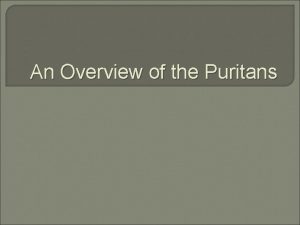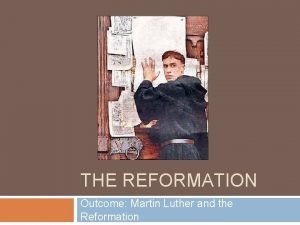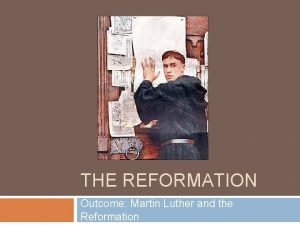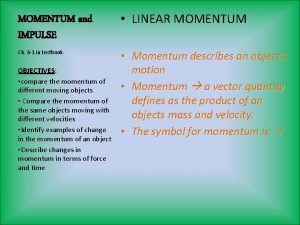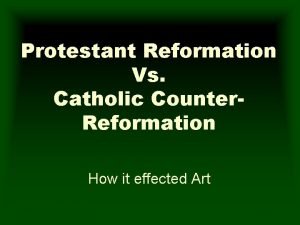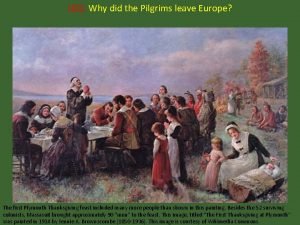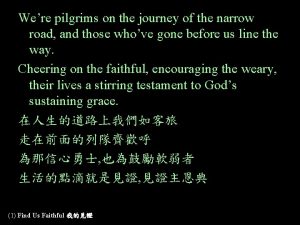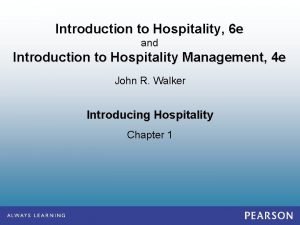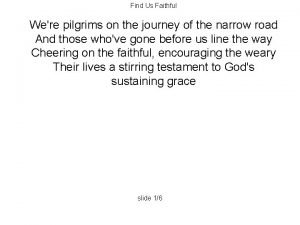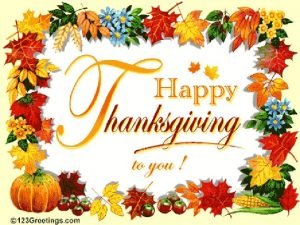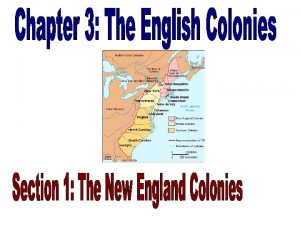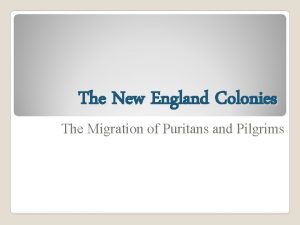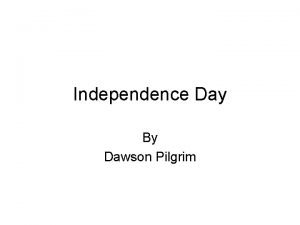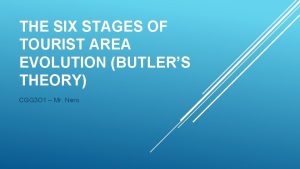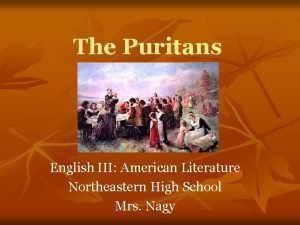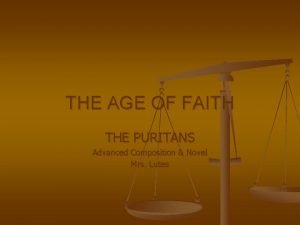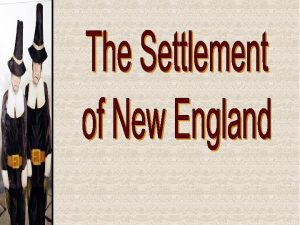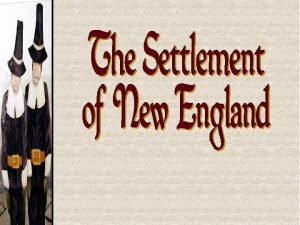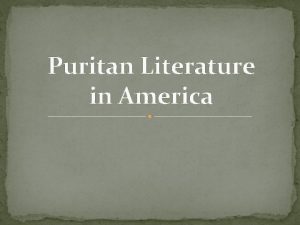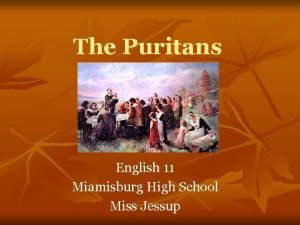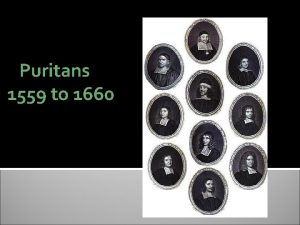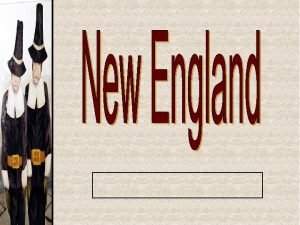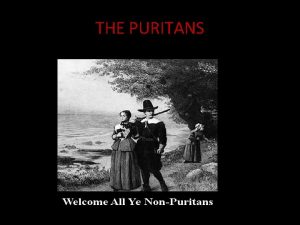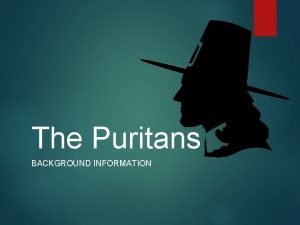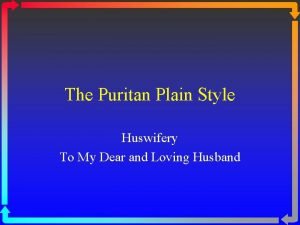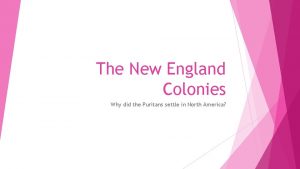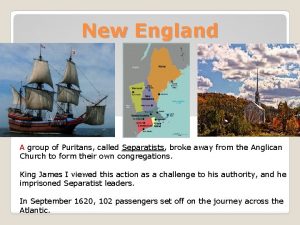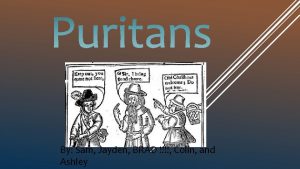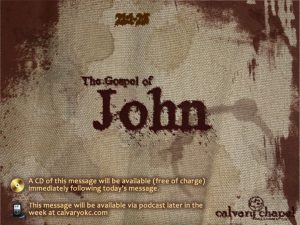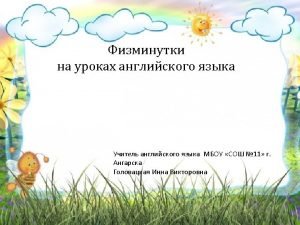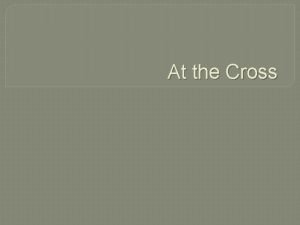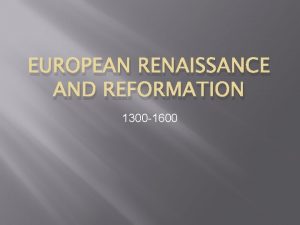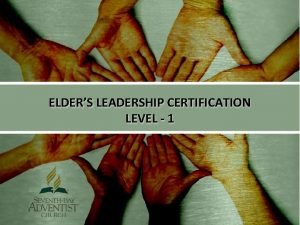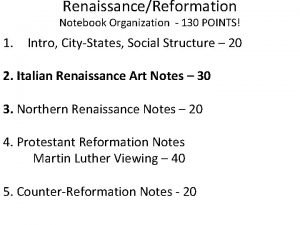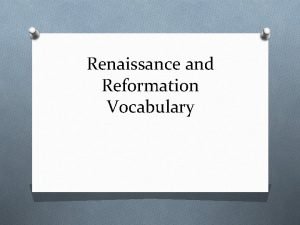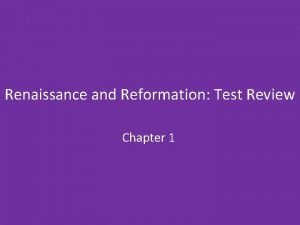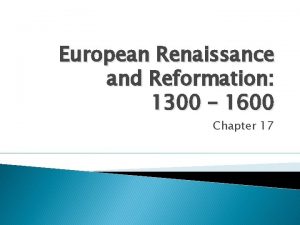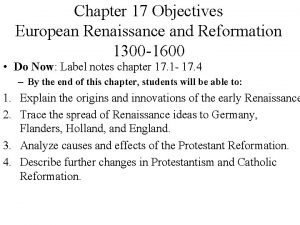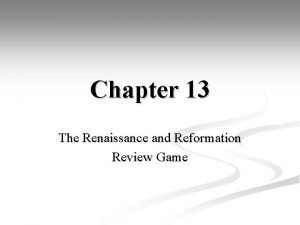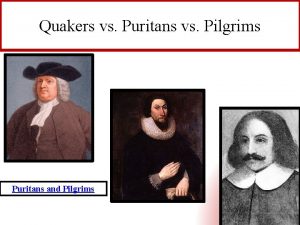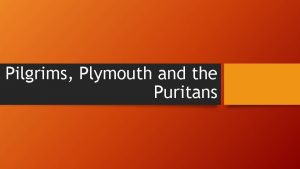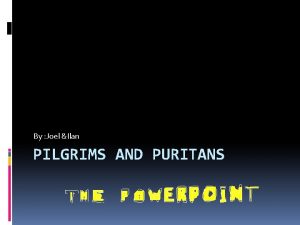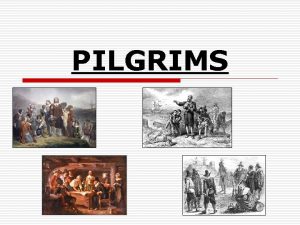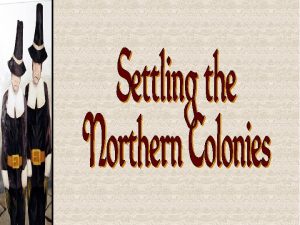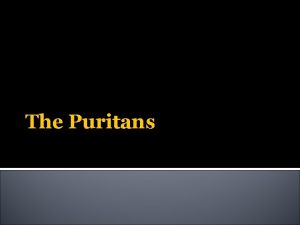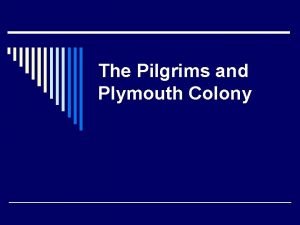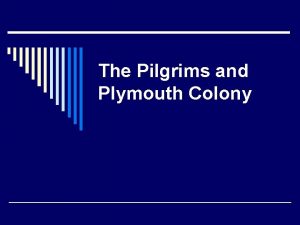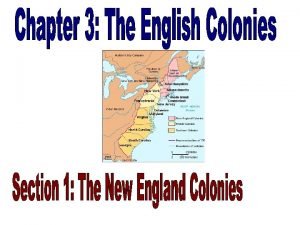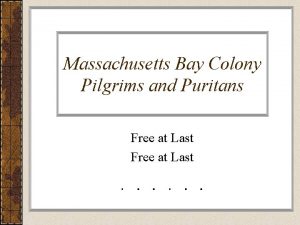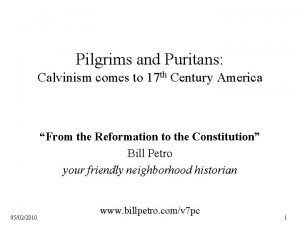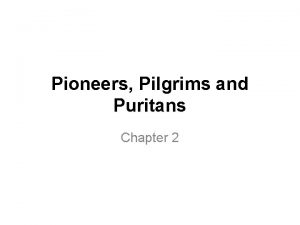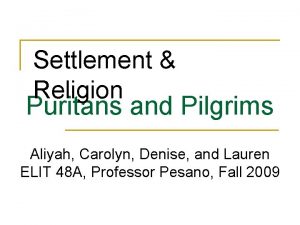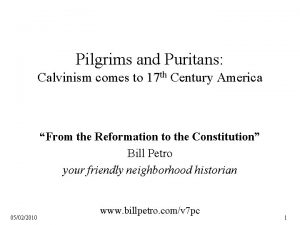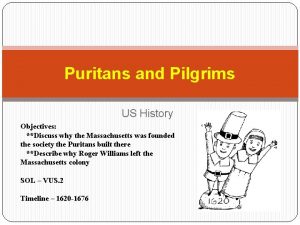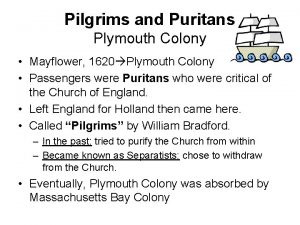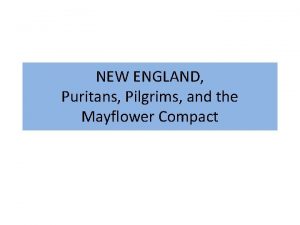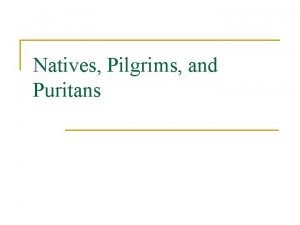Puritans and Pilgrims The Reformation slows Down 1





















































- Slides: 53

Puritans and Pilgrims The Reformation slows Down 1

The Puritans were English Protestants in the 16 th and 17 th centuries, including, but not limited to, English Calvinists. 2

John Calvin (1509 -1564) and John Knox (1513 -1572) 3

Pilgrims, is a name commonly applied to early settlers of the Plymouth Colony in present-day Plymouth, Massachusetts. They were Puritans who had first left England settled in Holland before coming to the United States. The First Pilgrims came to Plymouth in the early winter of 1620. The Pilgrims' story of seeking religious freedom has become a central theme of the history and culture of the United States. 4

John Wycliff was the herald of reform, not for England alone, but for all Christendom. He was the progenitor of the Puritans. (the Spirit of Prophecy, vol. 4, p. 86) 5

The Puritans wanted a pure faith but were not at first called Puritans. Those who stayed with the Church of England were called non-conformists and those who left the church were called separatists. They did not call themselves Puritans, but rather, “the Godly. ” 6

Blessed are the pure in heart: for they shall see God. (Matthew 5: 8) 7

Puritans believed that the English Reformation had not gone far enough, and that the Church of England was tolerant of practices which they associated with the Catholic Church. 8

The English Reformers, while renouncing the doctrines of Romanism, had retained many of its forms. Thus though the authority and the creed of Rome were rejected, not a few of her customs and ceremonies were incorporated into the worship of the Church of England. It was claimed that these things were not matters of conscience; that though they were not commanded in Scripture, and hence were nonessential, yet not being forbidden, they were not intrinsically evil. Their observance tended to narrow the gulf which separated the reformed churches from Rome, and it was urged that they would promote the acceptance of the Protestant faith by Romanists. (The Great Controversy, p. 289) 9

Compromise 10

To the conservative and compromising, these arguments seemed conclusive. But there was another class that did not so judge. The fact that these customs “tended to bridge over the chasm between Rome and the Reformation” (Martyn, volume 5, page 22), was in their view a conclusive argument against retaining them. They looked upon them as badges of the slavery from which they had been delivered and to which they had no disposition to return. They reasoned that God has in His word established the regulations governing His worship, and that men are not at liberty to add to these or to detract from them. The very beginning of the great apostasy was in seeking to supplement the authority of God by that of the church. Rome began by enjoining what God had not forbidden, and she ended by forbidding what He had explicitly enjoined. (The Great Controversy, p. 289) 11

Many earnestly desired to return to the purity and simplicity which characterized the primitive church. They regarded many of the established customs of the English Church as monuments of idolatry, and they could not in conscience unite in her worship. But the church, being supported by the civil authority, would permit no dissent from her forms. Attendance upon her service was required by law, and unauthorized assemblies for religious worship were prohibited, under penalty of imprisonment, exile, and death. (The Great Controversy, p. 289) 12

King James I Who was responsible for the translation of the bible that shares his name was not friendly to the Puritans. 13

King James I KAIM 81 In 1603 he quickly instituted a policy designed to enforce religious conformity. The Puritans would, he warned, adhere or he would “harry them out of the land. ” It was the King’s belief that his throne depended on the Church hierarchy: “No Bishop, no King. ” Westminister Abby 14

James I vigorously enforced The Act Against Puritans (1593), making it illegal for separatists to hold their own services. Anyone who did not attend the services of the Church of England forty days, and who attended private services “contrary to the laws and statutes of the realm and being thereof lawfully convicted shall be committed to prison, there to remain without bail until they shall confirm and yield themselves to same church. ” (Wikipedia: John_Robinson_(pastor)) 15

Many of the Puritans separatists left England went to Holland other areas with more religious liberty. 16

Difficulties, losses, and imprisonment were encountered. Their purposes were thwarted, and they were betrayed into the hands of their enemies. But steadfast perseverance finally conquered, and they found shelter on the friendly shores of the Dutch Republic. (The Great Controversy, p. 290) 17

But notice please: 18

In their flight they had left their houses, their goods, and their means of livelihood. They were strangers in a strange land, among a people of different language and customs. (The Great Controversy, p. 290) 19

In the end time, God’s people will have to flee and forsake all that they have. 20

John Robinson was Pastor of Puritans in Holland who were going to America. Some decided that they could or would not go. Pastor Robinson decided he would stay with the larger group which turned out to be the ones who stayed. Before the small group sailed he told them: 21

“Brethren, we are now erelong to part asunder, and the Lord knoweth whether I shall live ever to see your faces more [he did not]. But whether the Lord hath appointed it or not, I charge you before God and His blessed angels to follow me no farther than I have followed Christ. If God should reveal anything to you by any other instrument of His, be as ready to receive it as ever you were to receive any truth of my ministry; for I am very confident the Lord hath more truth and light yet to break forth out of His holy word. ”--Martyn, vol. 5, p. 70. (The Great Controversy, pp. 291, 292) 22

“For my part, I cannot sufficiently bewail the condition of the reformed churches, who are come to a period in religion, and will go at present no farther than the instruments of their reformation. The Lutherans cannot be drawn to go beyond what Luther saw; . . . and the Calvinists, you see, stick fast where they were left by that great man of God, who yet saw not all things. This is a misery much to be lamented; for though they were burning and shining lights in their time, yet they penetrated not into the whole counsel of God, but were they now living, would be as willing to embrace further light as that which they first received. ”--D. Neal, History of the Puritans, vol. 1, p. 269. (The Great Controversy, p. 292) 23

"Remember your church covenant, in which you have agreed to walk in all the ways of the Lord, made or to be made known unto you. Remember your promise and covenant with God and with one another, to receive whatever light and truth shall be made known to you from His written word; but withal, take heed, I beseech you, what you receive for truth, and compare it and weigh it with other scriptures of truth before you accept it; for it is not possible the Christian world should come so lately out of such thick antichristian darkness, and that full perfection of knowledge should break forth at once. "--Martyn, vol. 5, pp. 70, 71. (The Great Controversy, p. 292) 24

Remember the Church of England, though disconnected from Rome and some of her doctrines, retained many of them (Trinity, Sunday sacredness, immortality of the wicked). and much of her spirit. 25

Religious toleration was fine if you believed like they did, but if not, you could be imprisoned or even killed, especially for not attending worship services. Belief in the liberty of conscience for others was lacking in most Puritans. 26

It was the desire for liberty of conscience that inspired the Pilgrims to brave the perils of the long journey across the sea, to endure the hardships and dangers of the wilderness, and with God's blessing to lay, on the shores of America, the foundation of a mighty nation. Yet honest and God-fearing as they were, the Pilgrims did not yet comprehend the great principle of religious liberty. The freedom which they sacrificed so much to secure for themselves, they were not equally ready to grant to others. “Very few, even of the foremost thinkers and moralists of the seventeenth century, had any just conception of that grand principle, the outgrowth of the New Testament, which acknowledges God as the sole judge of human faith. ”-- Ibid. , vol. 5, p. 297. (The Great Controversy, p. 293) 27

The doctrine that God has committed to the church the right to control the conscience, and to define and punish heresy, is one of the most deeply rooted of papal errors. While the Reformers rejected the creed of Rome, they were not entirely free from her spirit of intolerance. The dense darkness in which, through the long ages of her rule, popery had enveloped all Christendom, had not even yet been wholly dissipated. Said one of the leading ministers in the colony of Massachusetts Bay: “It was toleration that made the world antichristian; and the church never took harm by the punishment of heretics. ” —Ibid. , vol. 5, p. 335. (The Great Controversy, p. 293) 28

toleration would not be used by James Madison in writing the United States Constitution for the founding Fathers understood that toleration was not the same as true religious liberty James Madison 29

The Puritans in New England enacted Sunday “Blue Laws” in the 17 th century to enforce “Sabbath” keeping upon the people. 30

Most states still today have some forms of “Blue Laws” restricting many forms of business. For example car sales are prohibited on Sundays in Illinois and most states, including West Virginia, prohibit, to some degree, the sale of alcohol on Sunday and some also prohibit hunting on Sunday. 31

Roger Williams Came to America in Boston on February 5, 1631 to enjoy religious freedom 32

Williams "was the first person in modern Christendom to establish civil government on the doctrine of the liberty of conscience, the equality of opinions before the law. "— Bancroft, pt. 1, ch. 15, par. 16. He declared it to be the duty of the magistrate to restrain crime, but never to control the conscience. “The public or the magistrates may decide, ” he said, “what is due from man to man; but when they attempt to prescribe a man's duties to God, they are out of place, and there can be no safety; for it is clear that if the magistrates has the power, he may decree one set of opinions or beliefs today and another tomorrow; as has been done in England by different kings and queens, and by different popes and councils in the Roman Church; so that belief would become a heap of confusion. ” —Martyn, vol. 5, p. 340. (The Great Controversy, p. 293) 33

Attendance at the services of the established church was required under a penalty of fine or imprisonment. “Williams reprobated the law; the worst statute in the English code was that which did but enforce attendance upon the parish church. To compel men to unite with those of a different creed, he regarded as an open violation of their natural rights; to drag to public worship the irreligious and the unwilling, seemed only like requiring hypocrisy. . ‘No one should be bound to worship, or, ' he added, 'to maintain a worship, against his own consent. ’”—Bancroft, pt. 1, ch. 15, par. 2. (The Great Controversy, p. 294) 34

Roger Williams was respected and beloved as a faithful minister, a man of rare gifts, of unbending integrity and true benevolence; yet his steadfast denial of the right of civil magistrates to authority over the church, and his demand for religious liberty, could not be tolerated. The application of this new doctrine, it was urged, would “subvert the fundamental state and government of the country. ”— Bancroft, pt. 1, ch. 15, pr 10. He was sentenced to banishment from the colonies, and, finally, to avoid arrest, he was forced to flee, amid the cold and storms of winter, into the unbroken forest. (The Great Controversy, p. 294) 35

“For fourteen weeks, ” he says, “I was sorely tossed in a bitter season, not knowing what bread or bed did mean. ” But “the ______ fed me in the wilderness, ” 36

David Hofmann “ravens” fed Roger Williams 37 Like they fed?

“For fourteen weeks, ” he says, “I was sorely tossed in a bitter season, not knowing what bread or bed did mean. ” But “the ravens fed me in the wilderness, ” and a _________ often served him for a shelter. — Martyn, vol. 5, pp. 349, 350. 38

hollow Tree 39 http: //www. savethehollowtree. com/id 17. html

“For fourteen weeks, ” he says, “I was sorely tossed in a bitter season, not knowing what bread or bed did mean. ” But “the ravens fed me in the wilderness, ” and a hollow tree often served him for a shelter. —Martyn, vol. 5, pp. 349, 350. Thus he continued his painful flight through the snow and the trackless forest, until he found refuge with an Indian tribe whose confidence and affection he had won while endeavoring to teach them the truths of the gospel. (The Great Controversy, p. 294) 40

Making his way at last, after months of change and wandering, to the shores of Narragansett Bay, he there laid the foundation of the first State of modern times that in the fullest sense recognized the right of religious freedom. The fundamental principle of Roger Williams’ colony, was “that every man should have the right to worship God according to the light of his conscience. ” His little State, Rhode Island, became the asylum of the oppressed, and it increased and prospered until its foundation principles—civil and religious liberty— became the corner-stones of the American Republic. (The Great Controversy, p. 294) 41

ginnylgorman Narragansett Bay 42

in Rhode Island 43 http: //eros. usgs. gov/error. html? col=States+-+NED+Shaded+Relief Narragansett Bay

By 1640, 20, 000 Puritans had come to New England 44

About this time, November 28, 1628 to be exact, someone was born in England who would become one of the most famous writers in the world! In Fact, other than the Bible, his book, _________ has enjoyed more circulation than any other English book! 45

John Bunyan Wrote: Pilgrim’s Progress 46

When John was about 21 he accepted Jesus Christ as his personal saviour. 47

In 1658, at the age of 30, he was arrested and indicted for preaching without a license. That same year his wife died leaving him with four children, one of which was blind. He continued preaching, however, and did not suffer imprisonment until November 1660, when he was taken to the County jail in Silver Street, Bedford. 48

Bunyan in prison with his blind child Mary 49

The Restoration of the monarchy by Charles II of England began Bunyan’s persecution as England returned to Anglicanism. Meeting-houses were quickly closed and all citizens were required to attend their Anglican parish church. It became punishable by law to “conduct divine service except in accordance with the ritual of the church, or for one not in Episcopal orders to address a congregation. ” Thus, John Bunyan no longer had that freedom to preach which he had enjoyed under the Puritan Commonwealth. He was arrested on 12 November 1660, whilst preaching privately in Lower Samsell by Harlington, Bedfordshire, 10 miles south of Bedford. 50

Later John was brought before the magistrate John Wingate at Harlington House and refused to desist from preaching. Wingate sent him to Bedford County Jail, to consider his situation. After a month, Bunyan reports (in his own account of his imprisonment) that Wingate's clerk visited him, seeking to get him to change his mind. The clerk said that all the authorities wanted was for Bunyan to undertake not to preach at private gatherings, as it was suspected that these nonconformist meetings were in fact being used by people plotting against the king. In answer to the clerk, John argued that God's law obliged him to preach at any and every opportunity, and refused to consider the suggested compromise. (Wikipedia) 51

It was during his time in Bedford County jail that John Bunyan conceived his allegorical novel: The Pilgrim’s Progress. Protestant missionaries commonly translated it as the first thing after the Bible. 52

Romans 13: 1 -4 1 Timothy 1: 9 Matthew 22: 21 Matthew 4: 10 53
 Puritans vs. pilgrims
Puritans vs. pilgrims The reformation outcome martin luther and the reformation
The reformation outcome martin luther and the reformation The reformation outcome martin luther and the reformation
The reformation outcome martin luther and the reformation Annotation slows down the reader to deepen understanding
Annotation slows down the reader to deepen understanding Annotation slows down the reader to deepen understanding
Annotation slows down the reader to deepen understanding Velocity and acceleration quick check
Velocity and acceleration quick check Slows down the flow of electricity.
Slows down the flow of electricity. A 2250 kg car traveling to the west slows down
A 2250 kg car traveling to the west slows down Protestants vs catholic
Protestants vs catholic In order to leave europe the pilgrims needed to
In order to leave europe the pilgrims needed to Were pilgrims on a journey of a narrow road
Were pilgrims on a journey of a narrow road Pineapple tradition
Pineapple tradition Were pilgrims on a journey of a narrow road
Were pilgrims on a journey of a narrow road Pilgrims
Pilgrims Who was the leader of plymouth colony
Who was the leader of plymouth colony Pilgrims
Pilgrims Pilgrims independence day
Pilgrims independence day Tourist stage
Tourist stage A moving cart slows slightly as it rolls toward a spring
A moving cart slows slightly as it rolls toward a spring If an automobile slows from 26 m/s
If an automobile slows from 26 m/s Puritans beliefs
Puritans beliefs Puritans beliefs
Puritans beliefs Separatists
Separatists Separatists vs puritans
Separatists vs puritans Puritanism vs calvinism
Puritanism vs calvinism Puritan literature in america
Puritan literature in america Whats a puritan
Whats a puritan Puritan beliefs
Puritan beliefs Puritan quotes
Puritan quotes Virginia company
Virginia company Total depravity puritans
Total depravity puritans Puritan tulip
Puritan tulip Puritans vs protestants
Puritans vs protestants Puritans background
Puritans background Puritan plain
Puritan plain Why did the puritans settle in new england
Why did the puritans settle in new england Which political cultural and economic characteristics
Which political cultural and economic characteristics Puritans who broke away from the anglican church
Puritans who broke away from the anglican church Why did the puritans cross the atlantic ocean
Why did the puritans cross the atlantic ocean I fled him down the nights and down the days
I fled him down the nights and down the days Heaven break out
Heaven break out Hands up, hands down
Hands up, hands down There's a place where streams of grace
There's a place where streams of grace Book
Book Who wrote praise of folly
Who wrote praise of folly Revival and reformation
Revival and reformation Lutheranism and calvinism
Lutheranism and calvinism Renaissance and reformation interactive notebook
Renaissance and reformation interactive notebook Renaissance and reformation vocabulary
Renaissance and reformation vocabulary A thriving trading region where the renaissance began
A thriving trading region where the renaissance began European renaissance and reformation answer key
European renaissance and reformation answer key European renaissance and reformation chapter 17
European renaissance and reformation chapter 17 European renaissance and reformation chapter 17
European renaissance and reformation chapter 17 Chapter 13 the renaissance and reformation
Chapter 13 the renaissance and reformation
